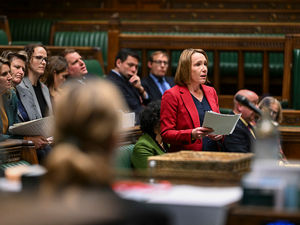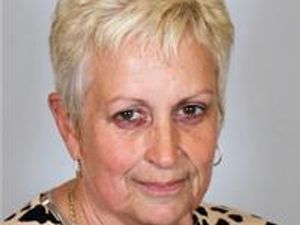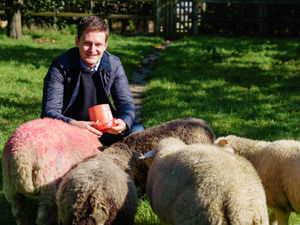'I would do it again' says Owen Paterson in angry response to 'biased' inquiry
Owen Paterson has issued an angry response after being found to have breached parliamentary lobbying rules – insisting he "would not hesitate to act in the same way again".
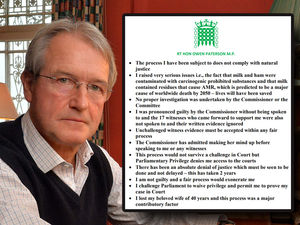
Mr Paterson, Conservative MP for North Shropshire, faces a 30-day suspension after an inquiry by the Parliamentary Commissioner for Standards found he lobbied for firms he worked for as a consultant.
The committee's decision relates to Mr Paterson's paid consultancies with Randox and Lynn's Country Food – which the committee says paid him nearly three times his £81,000 parliamentary salary.
The committee concluded his actions were "an egregious case of paid advocacy," that he "repeatedly used his privileged position to benefit two companies for whom he was a paid consultant," and that he had "brought the House into disrepute".
Mr Paterson has however hit back at the committee, accusing the commissioner of making up her mind before speaking to him.
In a 1,600-word statement Mr Paterson also challenged Parliament to waive privilege and allow him to challenge the findings in court.
Responding, the committee said that it rejected the criticisms and had addressed them in its report.
The North Shropshire MP said: "This is a biased process and not fair. It offends against the basic standard of procedural fairness that no one should be found guilty until they have had a chance to be heard and to present their evidence including their witnesses."
Mr Paterson said none of his 17 witnesses had been spoken to by the committee and claimed that the inquiry had played a major factor in the death of his wife Rose by suicide in June 2020.

He argued that the issues he raised during meetings on the parliamentary estate, which were the subject of the committee's investigation, and in e-mails to the Food Standards Agency, were those of public importance and food safety – relating to milk and ham.
He has also defended speaking to Ministers at the Department for International Development about improving laboratory tests in developing countries – deemed by the committee to be a potential benefit to Randox.
He said he believed the interventions were allowed under parliament's 'serious wrong' rules.
He said: "I raised serious issues of food contaminated with unlawful carcinogenic substances, to protect the public. I did not gain any benefit, financial or otherwise, either for myself or for either of the two companies that I advise.
"Neither has any evidence of gain by those companies been suggested.
"My actions are permitted by the rules of the House. I acted properly in raising serious issues of health and officials I engaged with have accepted this.
"The MPs’ Code of Conduct says that ‘Members have a general duty to act in the interests of the nation as a whole’. The rules clearly permit all MPs to initiate discussions with ministers and officials to address ‘a serious wrong or substantial injustice’. I was acting in the public interest when I raised these three issues of public health."
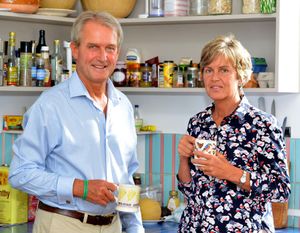
Mr Paterson added: "The rules are specific that MPs may raise a ‘serious wrong or a substantial injustice’ even if they or their external associates benefit incidentally, but neither Randox nor Lynn’s had any benefit (incidental or otherwise) from my actions to protect the public.
"Despite this tortuous and inadequate investigation, I would not hesitate to act in the same way again if confronted with new information about serious harms or wrongs requiring urgent remedy. I would also expect other MPs to do the same as it is no less than the public would demand.
"As a result of my interventions, staple foods consumed by millions, milk and ham, are now safer than before. Experts in overseas development now know that many of their laboratories abroad are underperforming, failing to protect the health of aid recipients and potentially wasting UK taxpayers’ money."
However, in its findings the committee rejected the suggestion the companies would not have benefited from his actions.
Its report said: "The fact that there was no immediate financial benefit secured by Randox or Lynn’s, and that witnesses have supported Mr Paterson’s claim that he was motivated by issues of public policy, appears to have misled Mr Paterson into thinking that he could not have breached the rules.
"But Mr Paterson’s approaches could clearly have conferred significant benefits on Randox and Lynn’s in the long term and even in the short term secured meetings that were not available without Mr Paterson’s involvement."
It added: "The committee commented that it does not doubt that Mr Paterson sincerely believes that he has acted properly.
"Mr Paterson is clearly convinced in his own mind that there could be no conflict between his private interest and the public interest in his actions in this case.
"But it is this same conviction that meant that Mr Paterson failed to establish the proper boundaries between his private commercial work and his parliamentary activities, as set out in the guide to the rules."

